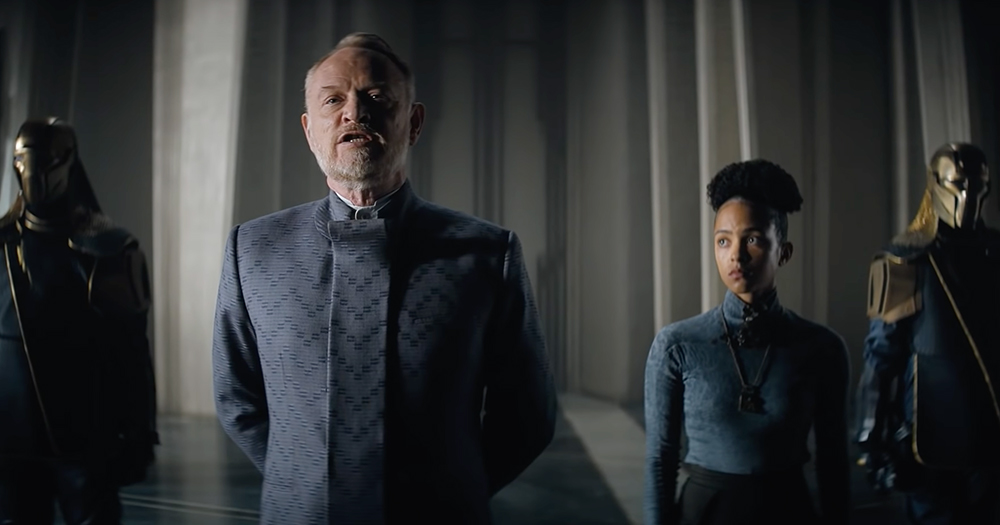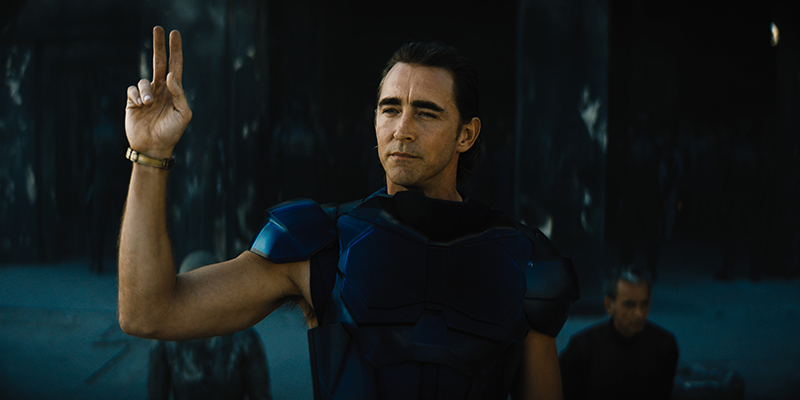AppleTV+’s Foundation Fan Fiction

Technically I think I should call the series Foundation on AppleTV+ a “re-imagining” instead of fan fiction, because it is made by professionals and not amateurs. After all, that is the term applied to other adaptations and reboots, such as the excellent 2004-2009 version of Battlestar Galactica, that have the same very basic plot structure and most of the same names as the original, but a completely different story or series of stories to drive that plot.
But, boy does this current Foundation series that just wrapped its first 10-episode season this week often seem like amateur fan fiction.
Below I will explain why I think that, and give a spoiler-free review of the first adaptation of Isaac Asimov’s classic Foundation series of novels. Well, mostly spoiler-free, because I do have to describe the basic premise of the plot of the series, which begins with the 1951 novel Foundation.
Also, before I start, let me acknowledge that it has been revealed in the years after Asimov’s death that he was a problematic person, unrepentant about his tendency to grab young women by the butt, without consent. I read Asimov’s works before this came out, and I can separate my appreciation of those existing works from my disdain over his behavior. Your opinion of how to handle that knowledge is your own, and just as valid as mine.
The basic plot structure that both the books and the series share is the story of Hari Seldon, a brilliant psychologist and mathematician on Trantor, the capital planet of a galactic empire that has existed for many tens of thousands of years. Hari develops a new science that combines psychology, mathematics and statistical analysis into something that can very accurately predict future events on a large scale, and the biggest prediction is the collapse of the Empire within a few hundred years. Worse, that collapse would be followed by a dark age of 30,000 years in length.
Hari believes he can reduce that to a mere millennium by the creation of an Encyclopedia Galactica which would contain all the knowledge in the galaxy. He is allowed to establish a Foundation to do that, but is told he has to do so on the planet Terminus, just about the farthest planet away from Trantor that could still be called in the galaxy. The first three novels are about the establishment of the Foundation, its early years and the first few crises Hari predicts will happen, the final death of the Empire, and eventually what would happen when something so unexpected and impactful happens that it throws the predictions off.
The series also draws from Asimov’s two prequel novels, Prelude to Foundation and Forward the Foundation, the last published posthumously in 1993. Mostly what it takes from those prequels are characters, although it completely changes their roles in the new story.
Oh, and the series often changes the gender of main characters, including Gaal Dornick and Salvor Hardin. That works for me just fine, and would have still worked fine if the two characters had roles even remotely close to what they had in the novels — which they don’t. To be fair, in some aspects Dornick’s character arc is more similar to the novel version that Hardin’s is, but that deviates wildly from the novels very early on.

Those story changes while attempting to pay lip service to the novels by using character names is probably my second biggest beef with the AppleTV+ series. Initially I was actually intrigued by these story changes, and it seemed like Foundation would be something I could view as an innovative re-imagining. The production design is often spectacular (and often cringingly amateurish), but where it does excel is in the spaceship and future technology designs. And the way the writers changed the nature of the Emperor still stands out to me as a great concept. Even if Lee Pace chews way too much scenery in that role.
But as the lip-service changes built up I became less tolerant of them, and as the science aspects of the science fiction started becoming less important than some spiritual, metaphysical mumbo-jumbo, the show lost me completely.
My biggest beef with the writers of the show is that they completely change the theme and message of Asimov’s novels. Isaac Asimov was a scientist — a professor of biochemistry at Boston University with a doctorate in chemistry from Columbia University. While many of his works are best described as “science fantasy” and are set so far into a future that technology currently considered impossible such as faster than light travel and battery-sized fusion reactors are commonplace, he is still regarded as one of the early proponents of “hard science fiction.” That basically means that, aside from currently impossible technologies, all other aspects of science should be adhered to.
In the very first episode, and worse so in the second, Foundation makes basic science mistakes about space that Asimov would never have made. Worse, the overall theme of the books is the value of knowledge in general and science in particular, and the show changes that to be about faith, belief, and pseudo-science garbage. The finale of this first season doubled down on that metaphysical change from the novels, and with story changes that don’t even make sense in the new story structure, much less as changes from the novels.
I can’t in good conscience recommend Foundation as either an adaptation or an original science fiction show. And that’s a shame, because there are some really good ideas in how it expands the world of the Galactic Empire, and some good performances. The series barely makes it to a 2.5 out 5, and I doubt I will watch the second season, which was announced by Apple in late October, just four episodes into this first season.
If you like our work and want to show your appreciation, feel free to tip us at Ko-fi or become a patron on Patreon.



